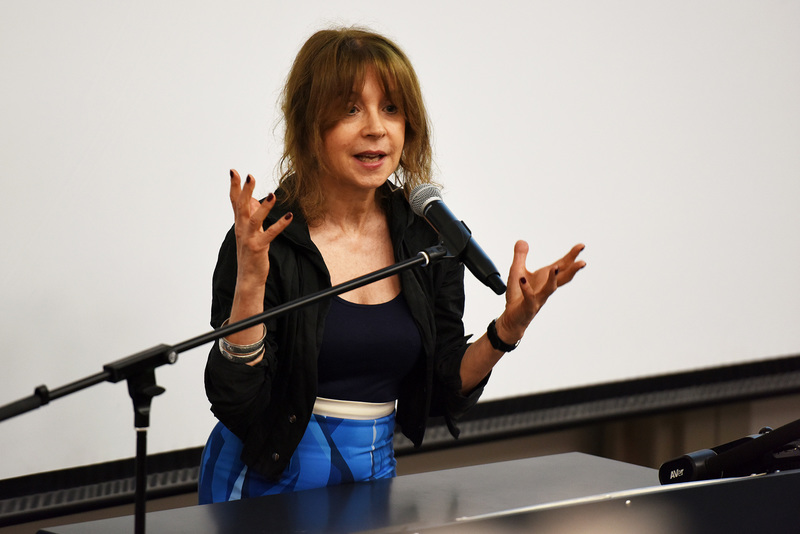'Stare straight into the eye of the perpetrator', says feminist scholar
17 March 2017 | Story Yusuf Omar. Photo Robyn Walker. Video Saadiq Behardien.
Author Professor Jacqueline Rose, renowned worldwide for her scholarship on the intersection of feminism, psychoanalysis, literature and politics, delivered the Vice-Chancellor's Open Lecture at UCT on 16 March 2017.
Titled Legacy, or What I Have Learned From You, Rose's lecture touched on a range of subjects relating to South Africa and the global south in general, from the student-driven protests against tertiary education fees that started in 2015 to “transgenerational haunting” that might explain otherwise inexplicable incidents such as a group of girls in Mlungisi township in the Eastern Cape, born after the end of apartheid, re-enacting a grisly necklacing scene.
“The 1913 Land Act, an act of sheer theft initiated by the British which laid the groundwork for segregation and then apartheid, would be a good enough place to begin not least because I know the still unresolved question of land, its cruelly unequal distribution, is at the heart of a continuing struggle in South Africa,” Rose said.
The author linked mainstream attitudes to public protest in South Africa to her experience as a student in Europe. Rose, who participated in student protests in the 1960s, recalled hysteria in France, with a major newspaper proclaiming that France was crumbling, ostensibly because of the discontent.
“The same hyperbole of destruction is thrown at the protests [in South Africa]. After all, France did not crumble or fall apart in the 1960s.”
How much had any of that changed, Rose wondered.
Recalling her own state-funded tertiary education, Rose expressed “solidarity” with the demand of free education for all, or at least for the poor, in South Africa.
“I have witnessed the deleterious effect on the house of critical thought of any whittling down of that fundamental right in the so-called free world,” she said.
A crucial question for Rose was what was passed down to younger generations in moments of historical crisis.
Citing South African academics, Sampie Terreblanche and Patrick Bond, who explained some of the challenges in post-apartheid South Africa which resulted in, say, the decolonisation project barely getting off the ground, Rose was certain that what should not be passed down was a responsibility for the next generation not to “cry foul, or claim that apartheid had not ended, or that their future was blighted by a past that had not gone away”.
Rose presented a smorgasbord of ideas from a range of contemporary philosophers. She threaded together strands of argument from scholars such as philosopher Hannah Arendt, who cautioned that the idea of “progress was dangerous in so far as it allowed rulers of the present dispensation to pretend that everything is just fine when it is not and allows those in powers to ignore the world forever”, and Frantz Fanon, who called for “radical empathy” in Wretched of the Earth.
“There is a violence in the human heart, perhaps implanted but certainly hugely aggravated by social injustice and cruelty,” said Rose.
She also used French psychoanalyst Jacques Lacan's idea of “disjointed but generative temporality”, to offer an explanation for some of the peculiarities on the South African socio-political landscape.
Rose further emphasised that no political struggle could escape the social arrangements of gender and sexuality.
She concluded with some advice: “Stare straight into the eye of the perpetrator still at large who … takes no responsibility for what he has done. Above all, do not blame those who erupt because they were burdened with an injunction to transcend history, an impossible demand that can have no place in any attempt to build a better world.”
Rose is Professor of Humanities and co-director for the Birkbeck Institute for the Humanities at the University of London. She spent the week of 13 to 17 March engaging with academics and students at UCT about issues ranging from an identity seminar held with the Trans Collective to sex and race as they related to the aftermath of Oscar Pistorius's murder trial.
Dr Victoria Collis-Buthelezi of the Wits Institute for Social and Economic Research delivered a formal response to Rose's lecture.
 This work is licensed under a Creative Commons Attribution-NoDerivatives 4.0 International License.
This work is licensed under a Creative Commons Attribution-NoDerivatives 4.0 International License.
Please view the republishing articles page for more information.
The Vice-Chancellor’s Open Lecture Series
The Vice-Chancellor’s Open Lecture series was established to enable anyone in the community, whether they are connected to the university or not, to have the benefit of hearing first-hand from academics, researchers and innovators from South Africa, but particularly from those around the world, who have distinguished themselves in their areas of expertise.
Attendance to the lectures is free of charge as the series is one of the ways that UCT seeks to give back to the Cape Town community.
2024
2023
2022
2021
2020
2019
2018
2017
2016
2015
There was no lecture in 2015.























